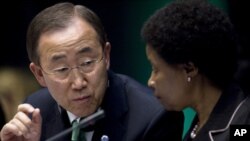More than 2,000 representatives from governments, non-governmental organizations, civil society and the private sector are attending a U.N.-sponsored conference on disaster risk reduction. U.N. Secretary-General Ban Ki-moon, who opened the conference, stressed the need for preparedness in reducing the worst effects of natural catastrophic events.
Natural disasters are not in short supply. Last year started off with the devastating earthquake in Haiti that killed more than 300,000 people and rendered more than one million homeless.
This year saw the catastrophic earthquake and tsunami in Japan, which killed thousands, made many homeless and caused a dangerous malfunction at the nuclear facilities in Fukushima.
U.N. Secretary-General Ban Ki-moon has seen the horrific impacts of these and other disasters first-hand. He has seen the suffering of the victims. He says these disasters clearly show no country or city, rich or poor, is immune.
But alongside the dangers from disaster, he says, rests the dangerous myth that acts of nature are unavoidable and inevitable. He says the aim of this global conference on disaster risk reduction is to show that preparedness can make a difference.
“As countries invest more in early warning and preparedness, mortality risk from floods and cyclones is trending down," he said. "At the same time, economic loss and damage to homes, schools, health facilities and livelihoods are on the rise.”
The U.N. chief warns that the world’s vulnerability to disaster risks is growing faster than the ability to increase resilience. He notes that weather-related hazards are on the rise as a result of global climate change. He says nuclear safety and the threat of multiple hazards add an even greater sense of urgency.
Ban acknowledges that appealing for investments in risk reduction during tough economic times can be an uphill battle. But he says solutions may be more a matter of spending wisely, rather than spending more.
“Building local capacities," said the U.N. chief. "Effective early warning systems. Proper land use planning. Good building designs. A focus on the needs of women. Even small investments in building, planning and training can yield remarkable result.”
Ban Ki-moon says disaster risk reduction is everyone’s business. He urges states to accelerate their efforts in building safer infrastructure, and teaching children and adults how to protect themselves against catastrophic events.
He says success in reducing the risk of disasters is measured by what does not occur. He says the school that does not collapse, the building that does not fall, the village that is not destroyed are all signs that preparedness works.
Global Disaster Conference Stresses Preparedness




